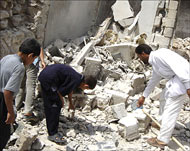US army: Al-Anbar offensive over
The US military has declared its week- long offensive near the Syrian border over, saying it has successfully “neutralised” a sanctuary for foreign fighters.

The US military said on Saturday it had killed more than 120 suspected fighters and wounded several others.
In a statement, the US military also said its forces had detained 39 with “intelligence value”, but offered no details about the detainees.
Nine US Marines were killed – six of them in a single incident on Wednesday – and 40 injured during the campaign known as Operation Matador, which targeted the Euphrates River villages of Karabila, Rummana, al-Qaim and Obaidi.
The offensive came at a time of increased attacks across the country where more than 400 civilians and government forces have died since the start of the month, mostly in bloody waves of car bombings.
Foreign fighters?
The US military had previously said Operation Matador was to root out foreign fighters loyal to Abu Musab al-Zarqawi, the most-wanted man in Iraq and members of the local Abu Mahal tribe.
 |
|
US and Iraqi forces claim to have |
But local fighters in al-Qaim, 320km west of Baghdad, insist there are no foreigners among them.
“We are all Iraqis,” declared one fighter, his face covered with a scarf.
“We are trying to protect our city’s entrances, and we will prevent the US forces from entering the city,” declared a fighter.
Apart from the fighters, however, streets were largely deserted, and shops and markets closed.
Seven-day operation
More than 1000 marines, soldiers and sailors participated in the operation, which began late on 7 May in al-Qaim.
|
“During the seven-day operation, marines disrupted known infiltration routes” |
Marines met resistance from heavily armed fighters – some in body armour – in the nearby village of Obaidi. Some 70 of them were killed in the first 24 hours alone, the US military said.
According to witnesses, the offensive triggered intense clashes in the town of al-Qaim and the fighting led to hundreds of families fleeing the al-Qaim area, some of them to remote desert villages farther southwest while others found refuge in schools and mosques to the East.
“During the seven-day operation, marines disrupted the known infiltration routes through the region and disrupted sanctuaries and staging areas,” the statement said. It also added the US and Iraqi forces would return in the future.
The border area is situated in the remote desert region, an ancient smuggling route and resistence hideout, which has been used as a staging area for fighters slipping over from Syria, receiving weapons and equipment for attacks in Iraq’s major cities, according to the military.
Car bombs discovered
Marines searching through small towns near the Syrian border discovered numerous weapons caches containing machine guns, mortar rounds and rockets. Six car bombs and material for making other improvised explosive devices were also found, the statement said.
 |
|
The US says its military gunships |
The military said the operation confirmed previous intelligence about the region north of the Euphrates river, including the existence of “cave complexes” in the nearby escarpment. It did not elaborate.
The military denied resident reports that they had been without water and electricity in some areas since the offensive began.
“Throughout the course of the operation, marines strove to ensure the well-being of the local Iraqi citizens,” the statement said.
“According to commanders in the area, the marines were greeted with greater hospitality from local villagers than is normally encountered.”
Paper: Zarqawi wounded
Meanwhile, a British newspaper reported on Sunday that al-Zarqawi was wounded and treated briefly at a hospital in Iraq last week before he disappeared with his men.
|
“He [al-Zarqawi] was bleeding heavily…” |
The doctor who claims to have treated him told an Iraqi reporter in the western city of Ramadi that al-Zarqawi was bleeding heavily when he was brought into the hospital on Wednesday, the Sunday Times reported.
“He was bleeding heavily and his escorts were well dressed with a look about them that was different from the casualties and family members we had been receiving,” the doctor was quoted as saying.
The doctor, who refused to specify the nature of the wounds and asked not to be identified, was detained by US forces for questioning on Friday, Ramadi residents were quoted as saying.